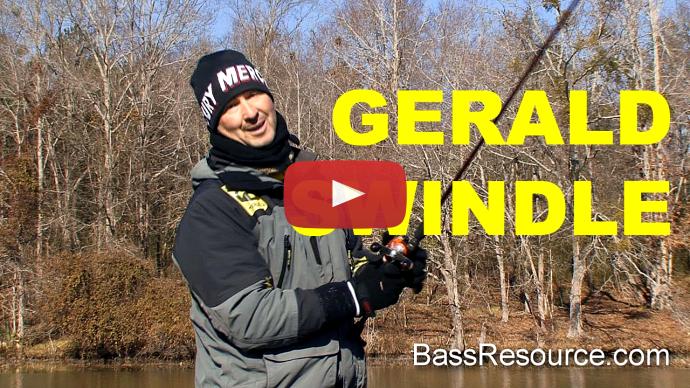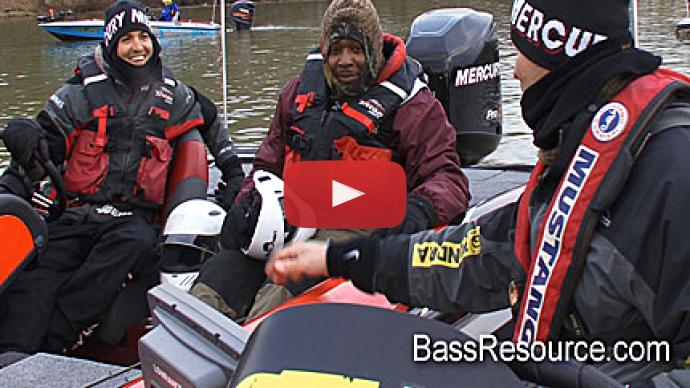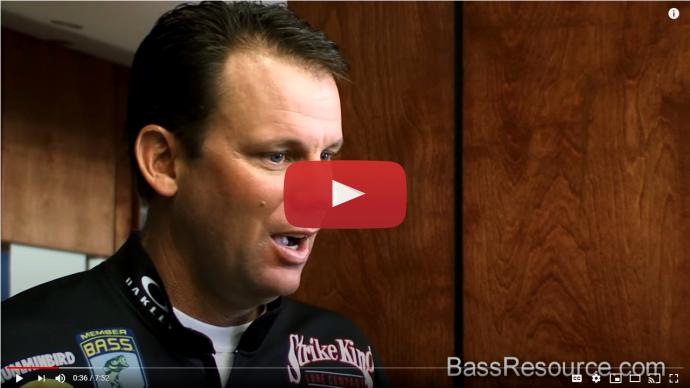Glenn: Hi, I'm here with Gerald Swindle at teh Bassmaster Classic. Gerald, good to have you with us today. Appreciate it. If you can tell us a little bit about how you got started into tournament fishing and how you got your way up to where you are today.
Gerald Swindle: Absolutely. Growing up I was raised on a small farm and my father kept me in the outdoors. We hunted, we fished. As a family that was our recreation. We couldn't afford to go to Disney World, so we fished. I mean, I literally grew up wading the river, and my father got into competitive fishing when I was in high school. And as I graduated high school I was going to go play Junior college basketball and I walked away from it. I still wanted to fish, I wanted to make money.
And once I started working, I was doing construction. I can remember I went and fished my first little like wildcat tournament, we call them at home, like a 40 boat tournament, and we won. My best friend and I. We didn't win but like $320 or something and I told him that night coming home, I said, if we can make money at this, I'm never going to work again.
And it was from that day at about 19 years old that I knew I wanted to do this. And I started fishing every, I'd fish four and five nights a week, the weekends, wherever they paid money I would fish. At the time I didn't, I was cutting grass, building houses for a living. I stole all the gas out of my Dad's lawnmower. Dude everything that we had that had gas in it I would steal the gas out of it when he was at work. I mean, I was just broke trying to make it. But I knew this is what I wanted to do.
Glenn: Excellent. So someone who's first starting out in the tournament fishing, trying to make it into the Elites if that's their goal, what kind of advice would you give them?
Gerald: I think most guys try to start too fast. They, they get, they join a club. I would recommend joining a club, fishing in your area a lot. But if people want to go straight from that to the Elite series, my whole theory when I broke into it was I wanted to be at a very dominant level locally before I left. That's kind of like your spring camp. That's your training, that's where you cut your teeth.
And once I become locally where I dominated in a lot of tournaments. You're not going to win every one. But you were in the top five, you were at that point when you pull up people are like, this guy could win a tournament, then I moved to the next level which was maybe fishing some draw tournaments.
I never did go from straight club level all the way to Elite series.
The biggest recommendation is to go slow, be competitive, extremely competitive at home before you make the next step. And then study marketing. Because once you start catching them then you have to sell yourself. And catching sponsors is a whole lot harder then catching fish.
Glenn: Well let's talk a little bit about that. What exactly do the sponsors do for you, and what do you do for them in return?
Gerald: Well, and we could go over that real quickly. When I go to a sponsor the biggest thing I'm selling is what I can do for you. Very seldom do I go in and sit down and say, hi I'm Gerald Swindle I need 100,000 dollars.
I go in and ask the company a little bit about themselves, where else they market at, are you in the outdoor division, have you ever looked at bass fishing, can I show you some numbers? Can I show you how many households we go out to, how many websites that you go out to? And I'll bring my report from last year and I'll say this last year alone I had 721 million impressions.
So I'm really trying to sell them on the value to their company outside of fishing. And it seems to work for me. You really have to show a company what you can do for them.
And so many guys are too worried about going, well I won the last eight club tournaments, I don't know why I can't get a deal. They could care less if you win every Saturday. They want to know how much product you can move and how much name recognition you can bring to their brand.
Glenn: Okay. And so you also, do you do trade shows for them as well or appearances?
Gerald: Oh, absolutely. Like Toyota. I just signed my deal with Toyota. I'll give them so many work days a year. I'll do trade shows. I'll appear at a dealership. And I have local promoters in Greenville, South Carolina or Greensboro, North Carolina that I work with every year where I do big fish and tackle trade shows. You spend a lot of time off the water working for your sponsors. That's how they really reap the benefit from having you.
Glenn: So obviously being a tournament angler is a lot more than just fishing then.
Gerald: Well I told my wife when I was driving to the Classic. I said if people only knew in my life how little fishing played a factor anymore. You don't fish until it's competition. And I said it's sad to say that I don't get to fish that local passion.
And I told her, she was laughing, I told her I want to go fishing with my buddies. Pay $30 to enter a tournament, track mud in my boat, you know stomp around all day and fish for $200. That was the passion of it.
I said at this level you don't do that. When you finally practice you only have three days, and as soon as you find them good God you run from it. You don't want to catch them. And then in the tournament as soon as I catch five, oh we've got to run from them again, so. Fishing is a very small role when you reach the elite level and you start trying to maintain a huge sponsorship base.
Glenn: Well, let's talk a little bit about fishing actually. Being on the water.
Gerald: Right.
Glenn: When you're pre-fishing for a tournament, what exactly are you trying to accomplish and how do you go about doing that?
Gerald: I have a real simple method when I practice. I don't, I look at the lake some, the maps and all that. I don't call ahead and get a lot of help. I put my time on the water and all I'm looking for is an area that's got fish in it. I'm not worried about how many I catch in practice, I don't want to win practice. We've got guys in here that win every practice. If they give trophies out for practice they'd have a whole room full of them. They don't write checks in practice. I just want to know that I round up to Little Watchita Creek and had four bites. If I get that gut feeling that that's where the fish is at, then I go in there the tournament and figure it out. A lot of guys will stay in there and practice and grind it and grind it 'til they hurt it. I'm simply looking for one area of the lake that I get the most bites in, I'll return there on tournament day and spend all my time.
Glenn: And when you're out in the tournament once you're on a spot, how do you decide how long to stay there and when to pick up and move? Aren't you worried someone might come in on your spot and take it?
Gerald: You do. You always worry that some of these guys have found our stuff. But you can't guard everything. It has to come to a point in the day when you're going to pick up and go somewhere else. Generally if I fish in an area, I just go with that gut feeling. It may be five minutes and it may be fifty five minutes. If I haven't had a bite and I start getting that gut feeling, I'm gone. Regardless of how many I've caught there.
I have a little saying. When I make my first cast, when I think I didn't, I shouldn't have caught one, I leave. It may take me three minutes, it may take me three hours. If I'm fishing an area and I make that cast and I think well that was just about a jack leg waste of time, I'm not going to catch crap here, I'm gone.
The first doubt you show in your fishing hole, you need to leave right then.
Glenn: So do you think, that instinct, is that what makes the difference between a pro angler and a weekend angler? Or is there other factors?
Gerald: I think it makes all the difference. I mean, weekend anglers, and there's some stud weekend anglers that have some of the best skills in the country. But when you fish like we do and travel as many lakes, it has to become a gut instinct of when to move, when to jockey around. And I think at this level these guys hone that instinct or skill.
Sometimes I don't know why I move. And I don't really know why I reach down and change baits in the first catch you catch one. It's just time on the water and instinct.
And there's little things you can go by, but you can't teach instincts. I can't go to a classroom and get on a chalkboard and teach you how I learned my outdoor instincts. I can't teach you that when I'm bowhunting in Illinois and I've never been there, why I climb this tree instead of that tree, and the deer walked under the one I was in. It's just part of the outdoor skill that you either, you kind of grow accustomed to. You learn it from being out there.
And it's really hard to teach it because every day a variable is different. You know. And it's kind of funky. People used to think Rick Clunn was crazy because he was zenning. But I think there's so much to be said for a guy who feels it in the seat of his pants when somethings changing. Very few people.
When you're in tune with bass fishing and you and I are standing together, I can tell you when the wind's changed directions. I can tell you the different variations when the birds have picked up and when they're not talking, the squirrels go to playing. You notice every detail around you, and it makes the picture a lot clearer.
When you're not in a zone the bass could be standing on a dry dock trying to jump in the boat and you'll go right by them because you're not focused on everything around you.
Glenn: Let me ask a bit about tournament rules. They change frequently, every year. If you had the opportunity to change one rule, what would that be?
Gerald: This is going to be easy. If I could change one rule in an Elite series Bassmaster tournament I would say absolutely no practice. The only way this country is ever going to see who's the greatest fisherman of all time is no practice. Because no matter what a lot of these guys tell you, they get help. Now they don't do it, they don't break the rule. We can get help 30 days prior to coming to a lake. And there's some 1-800 dollar bass going on around here. These guys will come and they'll milk the best local or the locals.
You want to know my fact? You announce the schedule, you put that lake off limits for a year, then you'll find out who's the best of the best.
Not even a practice day. When I go there I don't want a practice day. Want to show up on Wednesday night, meet the media, draw a partner, and Thursday, Friday and Saturday let's have the biggest tournament in the world with no practice. You know.
Glenn: That would be something else.
Gerald: That's the way you're going to find out who's the best, ever.
Glenn: Great point. I want to give you a moment to take the stage here, what I call a shameless plug. You can say hi to all your friends, you can say something about your sponsors. You can plug your upcoming DVD or whatever you've got going on. This is your opportunity to say whatever you want.
Gerald: Okay. My shameless plug is I would encourage everyone on the website, if you're home watching today, to be looking, I've got a book coming out. It will be in the stores maybe in about a year. I started doing this book, it was called, we don't really have a name. It really was a diary of my life in bass fishing. It's not a how to. I'm not telling you how to throw a jerk bait. I'm telling you the things I feel when I'm sitting in church, how I feel when I'm at a gas station, what goes through my mind when I'm troubled, what my family life's like. Who I am, what I'm made of.
Well I worked on this book with Tim Tucker for a year.
When Tim Tucker got killed I just let the project go. It was just too much.
Now bass has came back to me. James Hall has said let's put this book back in the works, and let's let the proceeds go to help feed Tim Tucker's children, maybe put them through college.
So if you're out there, you want a different kind of book. It's going to be a little bit off center because it's really about who I am, where I come from, what I believe in, what I don't believe in, the things I like, the things I don't like. It's not going to be another boring fishing book. But it is a daily diary for what went on for one year. And even now we're looking back and going back and dating it up to the day Tim got killed to now.
Glenn: Great, great. Let me ask you one off the wall question.
Gerald: All right.
Glenn: Jan or Marcia Brady?
Gerald: Both. With the roller skates on and the knee-high socks.
Let me ask you one. Now would you like Sugarland or Miranda Lambert. Country singers, come on now.
Glenn: I got to do Sugarland.
Gerald: She just tears me up, man, whoo I like that. I'll take Miranda Lambert too. She's getting a big booty on her, but I still like her. Got to quit eating Miranda, if you're out there.
Glenn: Okay. Well, thanks very much for taking some time with us today. Good luck in the Classic, appreciate it.



